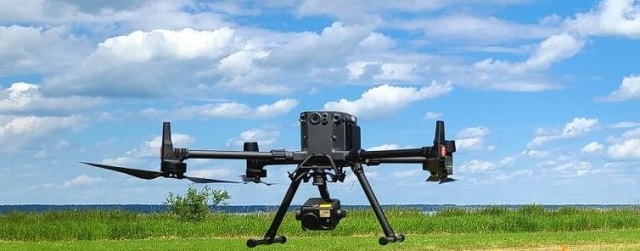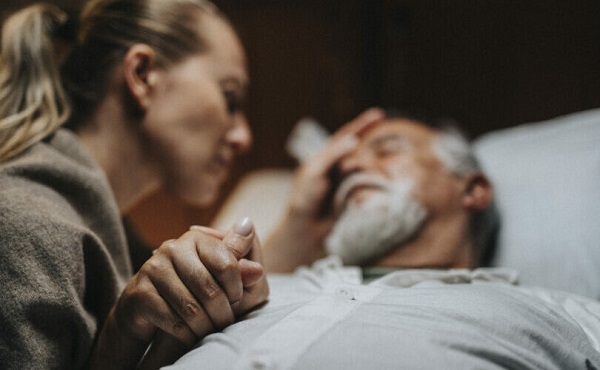Alberta
Stoney Nakoda RCMP conduct drone trials to enhance safety of Albertans

Alberta RCMP testing Remotely Piloted Aircraft Systems drone technology (Photo from Alberta RCMP Facebook page)
News release from the Alberta RCMP
Keep an eye on the sky!
Stoney Nakoda, Alta. – From June 4-June 15, 2024, Stoney Nakoda RCMP will be participating in a ‘pilot’ program to test Remotely Piloted Aircraft Systems (RPAS), commonly known as drones, and how it can be used to respond to calls for service. Stoney Nakoda was selected as one of three communities for the RPAS trials, scheduled for May and June of this year. The trials are being held in a mid-sized community, large municipality, and an Indigenous community.
RPAS technology is already used by the Alberta RCMP for a variety of needs including traffic accident reconstruction, search and rescue, major crimes investigation, and emergency response team calls. The trial is being conducted as another step in exploring potential new ways RPAS technology can be used to help ensure the safety of Albertans.
The objectives of the trials are to learn more about RPAS, to test different technologies, and to determine how RPAS can be used to better serve our communities.
During the trial period, the RCMP will be testing a new type of service delivery where RPAS will be used to assist police responding to certain calls by providing air support. RPAS will be deployed from the Stoney Tribal Administration Building (40 Morley Rd, Morley, AB) for various calls to service including crimes in progress, flight from police, suspicious persons, missing persons, assist EMS/Fire, or even to support natural disaster response.
The decision to further explore and expand RPAS usage was made following thorough research into the use of the technology by law enforcement in other jurisdictions. The decision is also based on recommendations to increase air support made by the Mass Casualty Commission following the Mass Casualty Event in Nova Scotia.
“We’re always excited to work with the people of Stoney Nakoda to figure out new ways that we can serve the community,” says Inspector Dave Brunner, Officer in Charge of the Stoney Nakoda RCMP. “These RPAS trials will give us the opportunity to test new technology and develop new methodologies that will help ensure the safety of members, our communities, and help us continue to build trust and confidence with the people we serve.”
The expansion of the RPAS program is being done in consultation with the RCMP National RPAS Program, law enforcement partners, municipal and provincial governments, and industry experts to ensure that the program is developed to best meet the needs of Albertans. Following the trial, the RCMP will evaluate the program to determine if RPAS can be used to enhance public safety and will update the public on the results.
The Stoney Nakoda Tribal leadership, which includes Chiniki, Bearspaw, and Goodstoney bands, wish to share:
“The Stoney Nakoda Nation welcomes the RCMP Drone-Trial Project and looks forward to assisting them in providing an enhanced police service to First Nations while respecting the privacy and culture of our people. We hope this new technology will aid the RCMP in reducing the levels of drug trafficking, the crime and pain this brings to our Nation. We look forward to receiving further briefings from the RCMP on the results of the trial and how this new capability will aid in providing increased safety and security to our people.”
RCMP-provided information related to the local RPAS trial will be hosted at Remotely Piloted Aircraft Systems Pilot Program (rcmp-grc.gc.ca).
Alberta
Alberta’s embrace of activity-based funding is great news for patients

 From the Montreal Economic Institute
From the Montreal Economic Institute
Alberta’s move to fund acute care services through activity-based funding follows best practices internationally, points out an MEI researcher following an announcement made by Premier Danielle Smith earlier today.
“For too long, the way hospitals were funded in Alberta incentivized treating fewer patients, contributing to our long wait times,” explains Krystle Wittevrongel, director of research at the MEI. “International experience has shown that, with the proper funding models in place, health systems become more efficient to the benefit of patients.”
Currently, Alberta’s hospitals are financed under a system called “global budgeting.” This involves allocating a pre-set amount of funding to pay for a specific number of services based on previous years’ budgets.
Under the government’s newly proposed funding system, hospitals receive a fixed payment for each treatment delivered.
An Economic Note published by the MEI last year showed that Quebec’s gradual adoption of activity-based funding led to higher productivity and lower costs in the province’s health system.
Notably, the province observed that the per-procedure cost of MRIs fell by four per cent as the number of procedures performed increased by 22 per cent.
In the radiology and oncology sector, it observed productivity increases of 26 per cent while procedure costs decreased by seven per cent.
“Being able to perform more surgeries, at lower costs, and within shorter timelines is exactly what Alberta’s patients need, and Premier Smith understands that,” continued Mrs. Wittevrongel. “Today’s announcement is a good first step, and we look forward to seeing a successful roll-out once appropriate funding levels per procedure are set.”
The governments expects to roll-out this new funding model for select procedures starting in 2026.
* * *
The MEI is an independent public policy think tank with offices in Montreal, Ottawa, and Calgary. Through its publications, media appearances, and advisory services to policymakers, the MEI stimulates public policy debate and reforms based on sound economics and entrepreneurship.
Alberta
Medical regulator stops short of revoking license of Alberta doctor skeptic of COVID vaccine

From LifeSiteNews
The Democracy Fund has announced that COVID-skeptic Dr. Roger Hodkinson will retain his medical license after a successful appeal against allegations of ‘unprofessional conduct’ by the College of Physicians and Surgeons of Alberta.
A doctor who called for officials to be jailed for being complicit in the “big kill” caused by COVID measures will get to keep his medical license thanks to a ruling by a Canadian medical regulator.
The Democracy Fund (TDF) announced in an April 4 press release that one of its clients, Dr. Roger Hodkinson, will retain his medical license after filing an appeal with the College of Physicians and Surgeons of Alberta (CPSA) over allegations of “unprofessional conduct regarding 17 public statements made in November 2020 and April 2021.”
Hodkinson had routinely argued against the dictates of public health and elected officials and “presented an alternative perspective on COVID-19, including the efficacy of masking and vaccines,” TDF noted.
In 2021, Hodkinson and Dr. Dennis Modry publicly blasted the then-provincial government of Alberta under Premier Jason Kenney for “intimidating” people “into compliance” with COVID-19 lockdowns.
In 2022, Hodkinson said that leaders in Canada and throughout the world have perpetrated the “biggest kill ever in medicine’s history” by coercing people into taking the experimental COVID injections and subjecting them to lengthy lockdowns.
These statements, among others, led the CPSA to claim that Hodkinson had promoted inaccurate or misleading information. “However, following negotiations with lawyers for The Democracy Fund, the CPSA limited its claims to arguing that Dr. Hodkinson’s comments violated the ethical code and extended beyond the scope of a general pathologist.”
Thus, Hodkinson did not “concede that any of his statements were false,” but “acknowledged that his criticisms of other physicians technically breached the Code of Ethics and Professionalism,” the group explained. “He also admitted that he should have clarified that his views were outside the scope of a general pathologist.”
Instead of having his license revoked, TDF stated that Dr. Hodkinson received a “caution” and will have to “complete an online course on influence and advocacy.”
“However, he did not concede that any of his statements were misinformation, nor did the tribunal make such a determination,” noted lawyer Alan Honner.
While Hodkinson received a slap on the wrist, a number of Canadian doctors have faced much harsher sanctions for warning about the experimental vaccines or other COVID protocols such as lockdowns, including the revocation of their medical licenses, as was the case with Dr. Mark Trozzi and others.
Some of Hodkinson’s warnings seem to have been vindicated by the current Alberta government under Premier Danielle Smith, who commissioned Dr. Gary Davidson to investigate the previous administration’s handling of COVID-19.
Davidson’s report, which was made public earlier this year, recommended the immediately halt of the experimental jabs for healthy children and teenagers, citing the risks the shots pose.
-

 2025 Federal Election2 days ago
2025 Federal Election2 days agoPoilievre to invest in recovery, cut off federal funding for opioids and defund drug dens
-

 Business2 days ago
Business2 days agoTrump threatens additional 50% tariffs on China, urges ‘patience’
-

 Alberta2 days ago
Alberta2 days agoProvince introducing “Patient-Focused Funding Model” to fund acute care in Alberta
-

 Alberta2 days ago
Alberta2 days agoMedical regulator stops short of revoking license of Alberta doctor skeptic of COVID vaccine
-

 International2 days ago
International2 days agoUN committee urges Canada to repeal euthanasia for non-terminally ill patients
-

 MacDonald Laurier Institute2 days ago
MacDonald Laurier Institute2 days agoRushing to death in Canada’s MAiD regime
-

 Energy2 days ago
Energy2 days agoEnergy group urges Trump administration to restock oil reserves
-

 Business2 days ago
Business2 days agoTrump eyes end of capital gains tax in 2025









